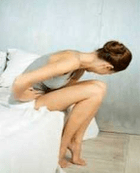One of the possibilities of urinary tract inflammation - cystitis - this disease is considered to be 80% of female disease due to the anatomical characteristics of the female body.
In women, the bladder should be more empty than men and are more prone to attacking various microbes, bacteria and viruses that can cause cystitis in women.
The symptoms and treatment of this disease are directly dependent on many factors, the nature of the process, the localization, the pathogen of the infection, and are classified as follows:

- According to the inflammatory process, the bladder may be damaged by the mucous membrane, muscle or submucosal layers.
- By the very nature of the disease, it is acute or chronic.
- According to morphological changes - cataral, cystic, ulcerative, bleeding, granulomatic, cancer, etc.
- According to the pathogen, it may be a bacterium (E. coli, staphylococcus, streptococcus, uraplasma, mycobacterium, gonorrhoea, tuberculosis, etc.), viral, fungus and non -bacteria (allergic, drug, toxic, chemical, chemical radiation).
Cystitis with - Which doctor should you contact?
Cystitis is quite painfully, with rapid urination, burns and sharp pains after emptying, constant sensation of bladder overflow, low body temperature, sometimes even a mixture of blood and mucous membranes.If the woman has symptoms listed, which doctor should you contact?
Women should contact the urologist first and foremost in order to clarify the diagnosis, as this doctor is involved in diagnosis and treatment of cystitis, and for examination, the nechiporenko bacteria should perform a general analysis of sowing, the ultrasound of bladder and cystoscopy.
In addition, a gynecology should be visited, as cystitis can often be caused not only by banal bacteria, but can also be combined with sexually transmitted infections, so the examination of gynecologist and the transfer of smear is also required to study vaginal microflora.In women with cystitis, treatment involves both antibiotics and uroseptics, and sometimes the doctor can be prescribed by inserting the bladder and physiotherapy.
Causes of cystitis in women
Most often, women's cystitis are caused by infectious agents, as the vagina, anus, short and fairly wide urethra are located in the bladder to penetrate various pathogenic microorganisms along the rising roads.However, there are other ways we can penetrate the bacteria into the urine system:
- The upward road is a urethra, ie from the urethra
- Reducing Road - On the contrary, from the upper urinary tract
- Lymphogen - from other small pelvic organs
- Hematogen is a rare method to penetrate the infection of remote organs.
If a woman has symptoms of cystitis, it should not be meditated, as the causes of cystitis, the pathogens are large, and for proper successful treatment, they must first determine them, clarify their sensitivity to antimicrobial drugs and prescribe only one comprehensive treatment.
Women's cystitis is very rarely isolated when hygiene, constipation, colds, sharp products or abuse of alcohol, use of panties - strings, a partner change, rare bladder emptying, etc.It causes reproduction of banal pathogenic bacteria.80% are E. coli, 15% in Staphylococcus, 5% of other bacteria, such as Pseudoscan, Klebsiella, Proteus.
- Most often, cystitis in the vagina or female genitals, such as bacterial vaginosis, thrush, diseases, female organs, bacteria vaginosis, diseases (gonorrhea, mycoplasmosis, chlamydia, urrelasosis) occurs (sometimes cystitis,Tuberculosis is a number of hidden infections and tuberculosis for a long time asymptomatic, imperceptible to see only a period of discomfort, subfebrile, weakness, does not visit the doctor and does not apply to diagnostic centers to study mild diseases.
- Other provocative factors for cystitis are pyelonephritis, bladder stones, and urine stagnation on the diverticul.
- Very often, cystitis occurs in pregnant women, which is explained by the change in the microflora and vagina and the urological tract due to endocrine and hemodynamic structure in the body in a pregnant woman.
- If a woman has diabetes mellitus, frequent manifestations of allergic reactions are exposed to constant toxic effects or cancer treatment using radiation therapy - they are also the risk factors of cystitis.
- Occasionally, after surgical manipulations, operations, and endoscopic examination, the mucous membrane is damaged, which contributes to women's cystitis.
- Symptoms of cystitis occur during menopause, as atrophic changes in menopause and lack of estrogens also reflect the urogenital tract.
In addition to acute cystitis, many women suffer chronic inflammatory procedures in the background of the slow infections listed above, or women's chronic cystitis are attached to the uterus and vagina.
Symptoms of cystitis in women
Provocative factors such as injury, colds, unprotected intercourse, infectious disease, etc.After acute cystitis can occur in women that always start very sharply, suddenly:
- Dysuria - rapid urination in the bladder rubber, burns and pain in the urethra, constant desire to empty the bladder.
- Before urinating, a woman usually has to make efforts.The frequency of urgency is so high that a woman has to visit the toilet every 15 minutes, sometimes involuntary urine -incontinence.
- Nicturia is the night's desire to empty the bladder.
- Pain usually accompanies the beginning and end of the urinary process.Outside the emptying process, the pain is only localized in the pubic and perineum.The intensity of the pain may be different, from mild discomfort to unbearable, strong sharp attacks.
- Almost always for women with cystitis, the urine is muddy, confusion.
- In acute cystitis, the temperature may increase to 38 ° C, weakness, deterioration of the general well.
- Very often, after the first acute process, the decline of the disease occurs when acute cystitis develops one month after treatment, so this indicates that it preserves the preservation of the infection.
- In a woman in chronic cystitis, the symptoms and treatment of the disease are the same, and the frequency of pain and urination is not expressed so sharply.During the aggravation of the chronic process, the clinical image of acute cystitis is possible and neither laboratory nor symptomatic data during remission indicate the inflammatory process.

Treatment of cystitis in women
Women should seek advice for both the gynecologist and the urologist to treat acute and chronic cystitis.Usually in acute cystitis, with proper therapy, the cure is literally done in one week.
If the infectious nature of cystitis is confirmed, treatment is mandatory to destroy the pathogenic microorganisms with antimicrobial agents and antibiotics to which the pathogens are sensitive:
- Recently, fluoroquinolones such as ciprofloxacin, norfloxacin, phosomicin, nitrofurans are widely used in women.These drugs for treating cystitis have side effects and have many contraindications, so their use is only possible as prescribed by the doctor.
- If a specific microflora is found in the analysis, the treatment contains possible antiviral agents, antifungal or antimicrobial agents.
- In case of severe pain, antispasmic or non -steroid anti -inflammatory drugs are prescribed.
- If there are no allergic reactions to herbs, you can use various variants of the Phyto-one-a lingonberry leaf, the field horse, the UVA URSI.It is best not to use herbs in bags, but to collect, dust beer, and stick to it as the usual brew of herbs.
- Native antiseptic is an effective drug for cystitis, which is a fairly one -time administration of this drug.
- There are also many finished tablet medicines that are of herbal origin, which are used as supplementary when they are alleviated by an acute inflammatory process, they should be consumed for a long time for a long time.Cranberries many help,Cranberry fruit drinksCystitis or blueberry extract with a tablet form.
- When treating cystitis, women should increase their daily fluid to rapidly eliminate toxins from the body, and it is also worth keeping in a nutritious reduction diet.
Preventing cystitis - useful tips for women
- Sexual -related urinary deflorazione cystitis and temporary infection arises with frequent changes in partners if one does not monitor hygiene and is not used for condoms during sexual intercourse.
- The key to observing personal hygiene is the lack of bacterial cystitis relapse.Use the devices in neutral acid-base balance for intimate hygiene.
- Checking the completeness and timely emptying of the bladder does not allow longer urine to stagnate.
- Smoping, especially wet legs in cold weather, trigger aggravation.
- Drink at least 2 liters of water, freshly pressed juices or blueberry fruit drinks.
- Do not wear sheep's panties if you have chronic cystitis, when you wear such a canvas, the intestinal stick will easily reach the urethra.And they do not wear too tight clothes, jeans, disrupt normal blood circulation in the pelvis.
- The construction also triggers cystitis relapses, trying to include dried apricots, plums, fresh cabbage, and other fruits and vegetables in the daily diet.




























